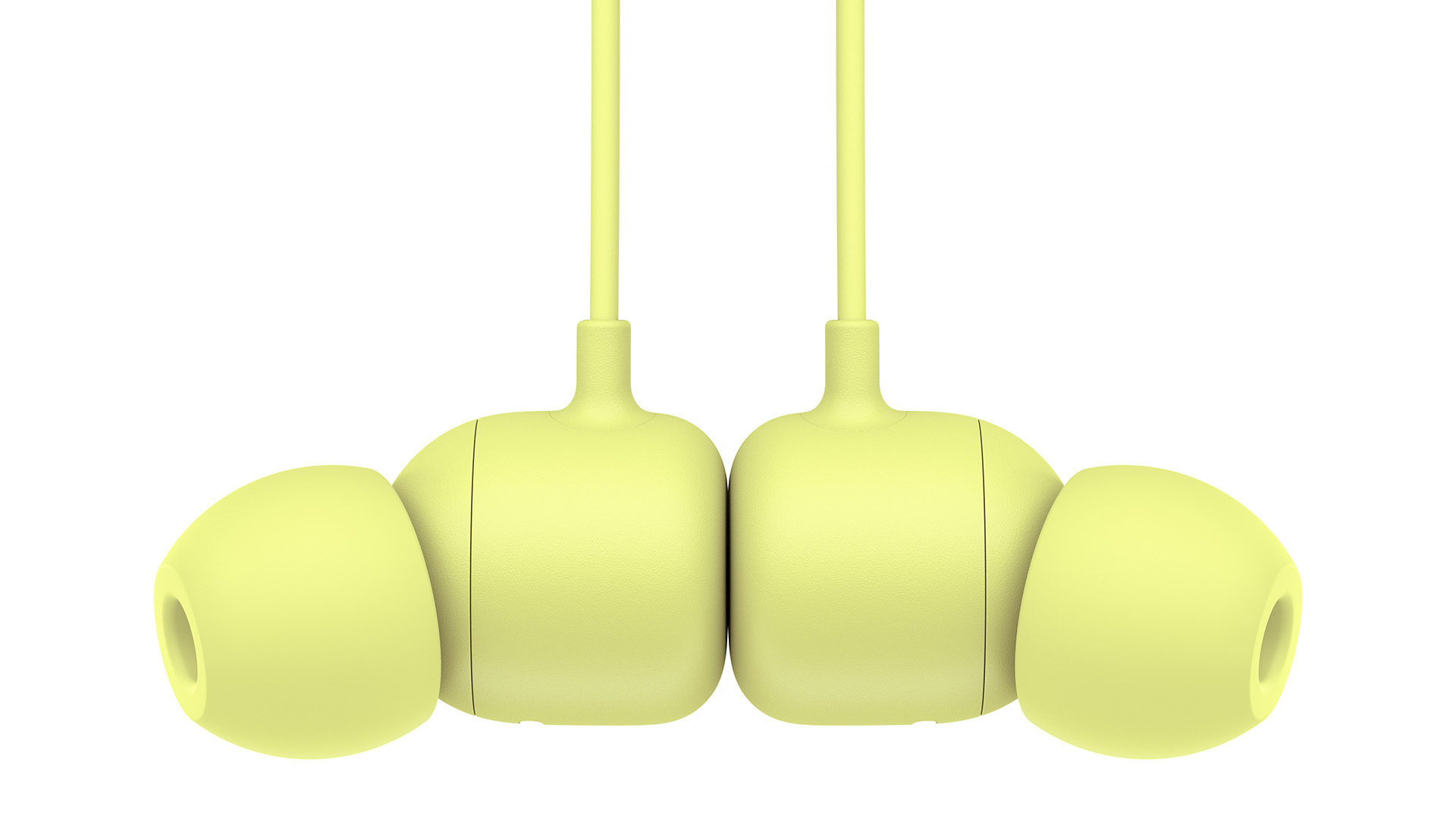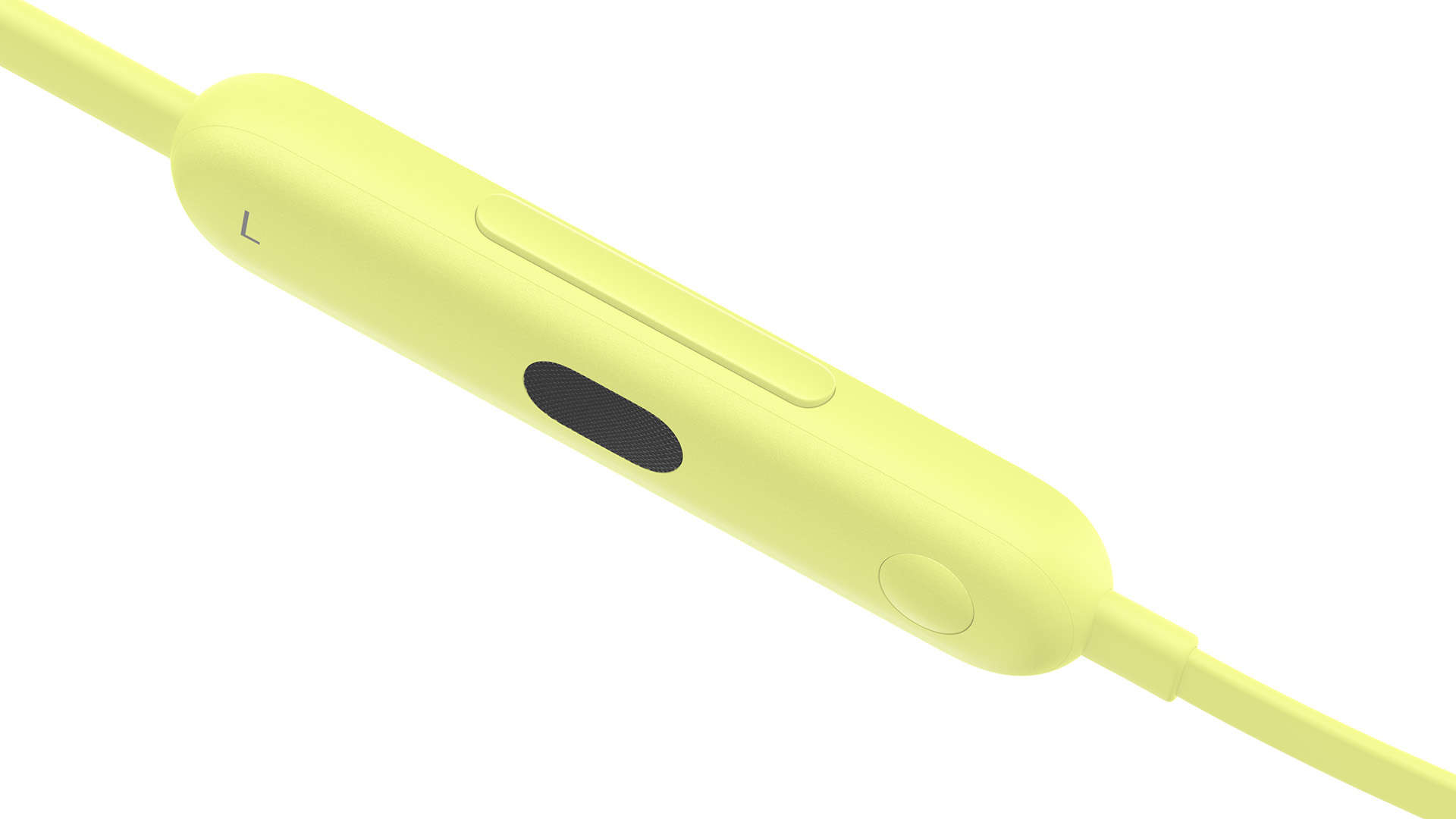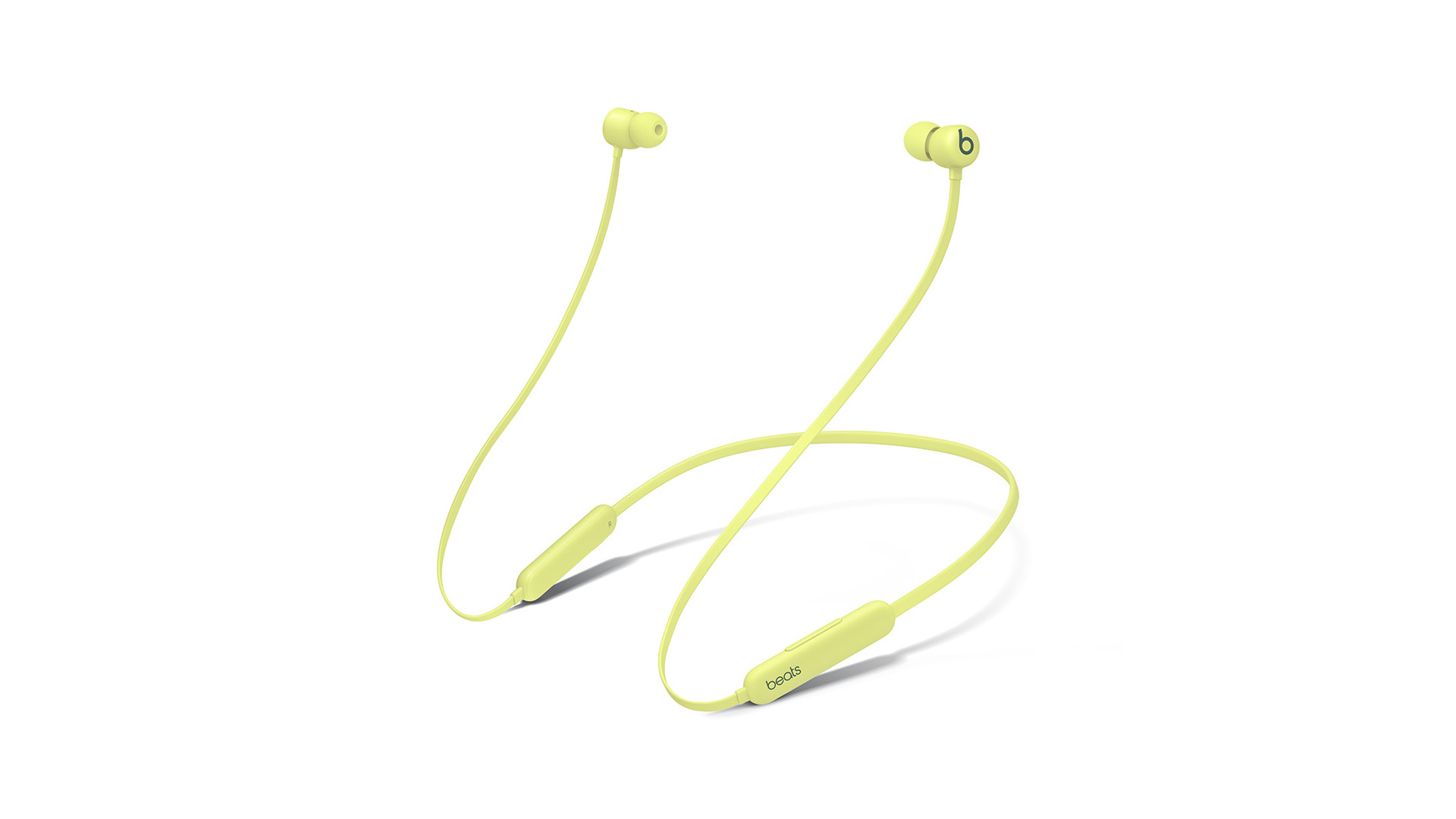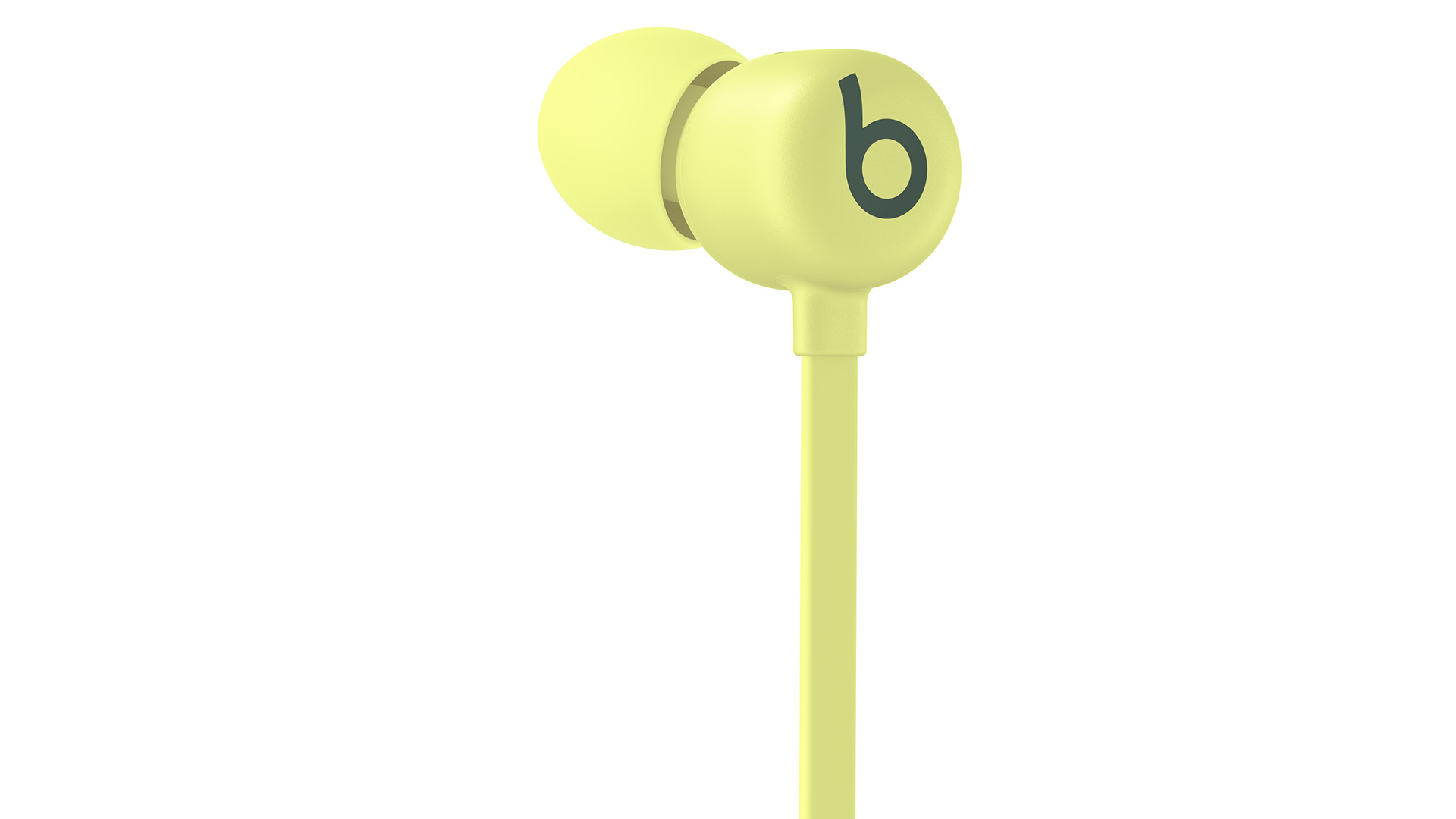What Hi-Fi? Verdict
A solid, decent-sounding set of entry-level wireless in-ears – and you’ll never worry about losing one
Pros
- +
Punchy lows
- +
Durable build
- +
Extra features for iOS users
Cons
- -
Treble is rounded off
- -
Fit may be an issue
Why you can trust What Hi-Fi?
As recently as 2017, one could argue that most true wireless in-ear designs were beyond the budgets of many music-loving commuters. However, a less fancy neckband design offered a wallet-friendly and still (sort of) wireless solution.
As competition and manufacture intensified and improved, though, true wireless earphones with wireless charging became a reality for about the same price as a round of drinks for your household bubble. So why, in 2020, has Apple decided to buck the true wireless trend by releasing the Beats Flex, an affordable wireless neckband design under its Beats subsidiary brand?
Consider that the iPhone giant has stopped bundling free headphones with its new devices and things become clearer. You can still buy a set of budget Lightning wired buds from Apple, but for anyone concerned with their smartphone sound, one rung up now brings you neatly towards the Beats Flex.
They’re available in some fresh hues (including our Yuzu yellow sample), they charge via USB-C, have a 12-hour battery life, and courtesy of one-tap audio share you can split sounds with nearby Beats or AirPod headphones (provided you have an iPhone 8 or later running iOS 14). And did we mention that they’re only £50 ($50)?
Comfort

The Beats Flex comes with four eartip options, which is a good thing since the pre-fitted pair is too big for our ears. An unusual and smaller double-tip option suits, but the tips are on the larger side in general.
The necks of the buds are nicely mounted at a slight angle from the driver housings with the aim of offering a fit that doesn’t tug on the cable when worn. You shouldn’t have to worry about touching the earpieces at all once they’re in, since all touch functionality is located on two in-line control centres on the cable, both of which sit comfortably on your collarbones for easy access.
The cable is flat, almost like a strand of tagliatelle, and though it’s more than long enough to suit most wearers, we find it kinks and tangles a little during the course of our listening. There is some minor noise from the cable as it pulls, too.
The latest hi-fi, home cinema and tech news, reviews, buying advice and deals, direct to your inbox.
One useful feature is a set of magnets in the Beats-branded top surfaces of the earbud housings, which are strong enough to find each other when you remove them from your ears. Voila, the whole set-up instantly becomes a secure necklace. Overall, the Beats Flex have a satisfyingly fuss-free build and finish.
Build

These earbuds are essentially an evolution of the neckband-style Beats X from 2017. They now charge via USB-C and have longer battery life (12 hours over 8 hours), while a ten-minute ‘Fast Fuel’ charge that gives 1.5 hours of playback. They have also been reworked for better sound quality and improved mic performance.
The control centre on the left side has an easily accessible volume switch (push the upper end to increase, the lower edge to decrease) and a little button on the inside which can be tapped once to play and pause music, twice to skip tracks and three times to skip backwards. Long-pressing it accesses Siri.

Built-in microphone Yes
Battery life Up to 12 hours
Bluetooth Yes
Dimensions (hwd) 1.6 x 10.6 x 86cm
Weight 18.6g
During calls, we find the built-in mic clear and call-handling a breeze. The right control centre houses a power button that perfectly mirrors the placement and size of the USB-C port on the left-hand side of the controls, but it features a solo LED light to indicate power and battery life: this glows white for ‘on’, flashes white when pairing and blinks red when charging.
As you might expect from an Apple product, using them with an iOS device has its perks. Turn the Beats Flex on and bring them close to your Apple device and you get quick pairing functionality, for example. Android users have to pair either manually via Bluetooth or by downloading the Beats app for Android, which offers quick pairing access, firmware updates and battery level information.
So, while Android users get a basic Bluetooth experience, Apple's W1 chip here elevates things to the next level for iOS users. Audio Sharing, which lets you connect two pairs of compatible AirPods and Beats to a single device, to simultaneously listen to the same content, is another bonus.
We’re testing with an older iPhone 8 running on the most recent iOS update and find the promised auto-pause functionality when the buds’ magnets click together a little hit and miss. Nevertheless, these are entry-level wireless buds and their main function must surely be an improved wire-free sound over the £19 ($19) EarPods.
One thing to note here is that W1 chip is the same one found in the previous Beats X, not the more advanced H1 chip found in the second-generation AirPods, AirPods Pro, Powerbeats Pro, Beats Solo Pro and Powerbeats 4.
That means the Beats Flex won't support some iOS 14 features, including automatic switching to another device or hands-free Siri support. There’s no noise-cancelling either, but with the correct seal you’ll still enjoy good levels of passive noise isolation.
Sound

The Beats Flex headphones easily better Apple’s 2012 wired EarPods for sound – in direct comparison, the once-bundled EarPods sound overly bassy. We stream The Waterboys’ The Whole Of The Moon on Tidal, and the Beats Flexes offer a far more cohesive mix across the frequencies and a better sense of timing throughout.
Melissa Etheridge’s textured and emotive vocal in Come To My Window is central and detailed through the mid to low frequencies. It isn’t perfect, mind. As the song continues, we note limitations in the treble.
Instruments such as the pulsating electric guitar riffs come through a little weak, without the sparkling impact through the upper registers offered by our reference product at the price, the true wireless Earfun Air. It’s a shame, because while the Beats Flex in-ears still offer a foot-tapping sound and an agile, taut bassline, there’s an extra ounce rolling off through the top end.
We stream Charles Bernstein’s theme tune for the movie A Nightmare On Elm Street and find plenty of atmospheric tension through the mids and lows. It’s just that synths, twigs crunching in the grass, spine-tingling keys and tinkling, distant laughter peals aren’t quite as impactful as they are through the Earfuns.
It’s a small issue; the Beats Flex offers a considered, smooth sound profile that’s preferable to one that is harsh or bright through the upper frequencies, but even at this affordable level it’s important to note.
Our Halloween Tidal playlist continues to Danny Elfman’s orchestral original score, Tales From The Crypt, and the brass section comes through musically strong and full-bodied. The cymbal crashes, darting strings and woodwinds feel slightly recessed, but it’s a competent performance nevertheless.
Verdict
If your budget can stretch northwards a little, Earfun’s true wireless option bypasses potential cable noise, sounds better for detail through the higher frequencies and lasts longer before needing a charge.
That said, the Beats Flex easily betters much of what is currently on the market for iOS users at £50 ($50) – it's nicely featured for the money and competently made. For those after an affordable, Apple-centric neckband design, the Beats Flex offers just the thing.
SCORES
- Sound 4
- Comfort 4
- Build 4
MORE:
Read our guide to the best wireless headphones
Read our Beats X review
Read our Earfun Air review
What Hi-Fi?, founded in 1976, is the world's leading independent guide to buying and owning hi-fi and home entertainment products. Our comprehensive tests help you buy the very best for your money, with our advice sections giving you step-by-step information on how to get even more from your music and movies. Everything is tested by our dedicated team of in-house reviewers in our custom-built test rooms in London, Reading and Bath. Our coveted five-star rating and Awards are recognised all over the world as the ultimate seal of approval, so you can buy with absolute confidence.

